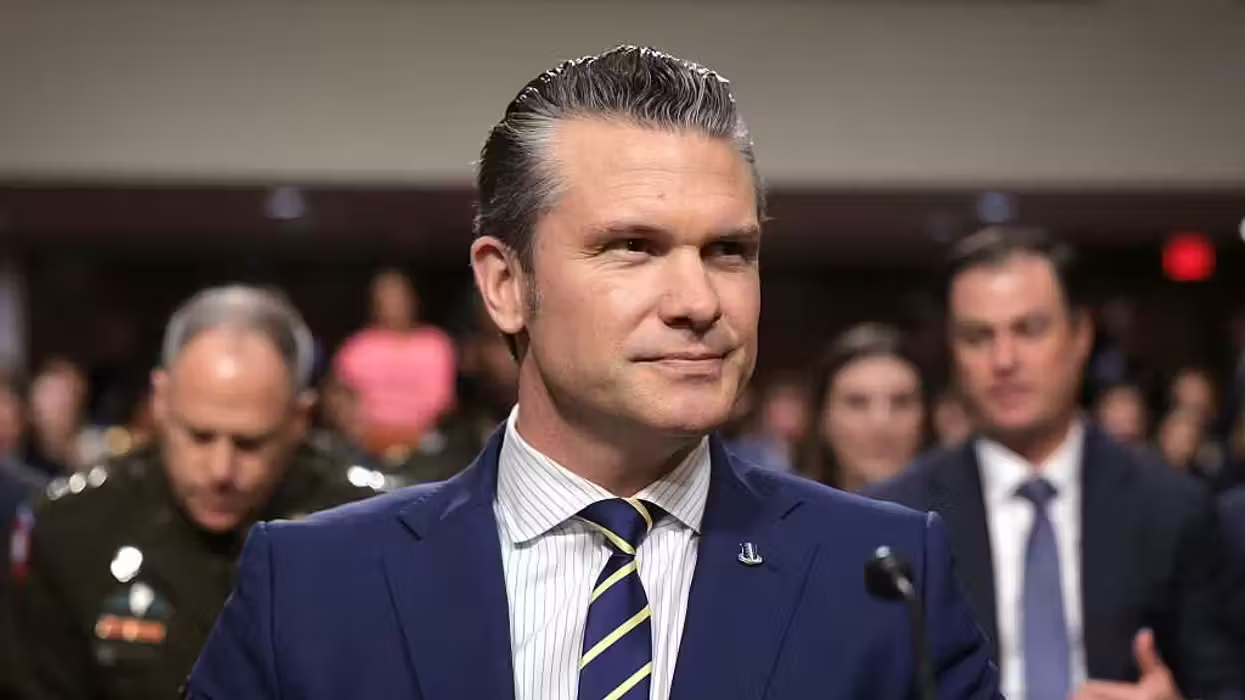
© 2025 Blaze Media LLC. All rights reserved.
"We will smoke the rats out of their bunkers."
ZAWIYA, Libya (The Blaze/AP) -- Libya's rebels threatened to isolate Tripoli by blocking key supply routes and cutting oil pipelines on Monday after a dramatic weekend advance put them in the strongest position since the 6-month-old civil war began to attack Moammar Gadhafi's stronghold.
In Washington, the Obama administration said the U.S. was encouraged by the rebel advances and hoped they had broken a monthslong stalemate with Gadhafi's forces.
"We are closing the roads for Gadhafi so there is no way for him to bring anything to Tripoli," a rebel field commander, Jumma Dardira, told The Associated Press.
The rebels' push into the strategic city of Zawiya on Saturday brought them within 30 miles (48 kilometers) of Tripoli, the closest they have ever gotten.
Also Monday, U.S. defense officials said Libyan government forces tapped into their stores of Scud missiles this weekend, firing one for the first time in this year's conflict with rebels, but hurting no one.
The missile launch was detected by U.S. forces shortly after midnight Sunday and the Scud landed in the desert about 50 miles (80 kilometers) outside Brega, said one official, who spoke on condition of anonymity to discuss military operations.
Rebel and regime forces have battled over the strategic port city of Brega throughout the conflict, and control has swung back and forth between the two sides.
According to the military, the Scud missile was launched from a location about 50 miles (80 kilometers) east of Surt, a city on the Mediterranean coast about 230 miles (370 kilometers) east of Tripoli. Noting that Scuds are not precision guided missiles, officials said they couldn't tell if Brega was the target.
Early in the conflict, NATO and U.S. forces targeted sites around the country where Gadhafi stored surface-to-surface missiles like Scuds, largely because they worried that he would use them to target areas beyond his control.
Two senior U.S. officials said it is too soon to tell whether the Scud strike was a singular incident or if it represents a new phase of fighting. Scuds have a range of up to 500 miles (800 kilometers).
After three days of fierce battles for Zawiya, a city of 200,000 on the Mediterranean coast, rebel commanders said they controlled the south and west of the city and were fighting for the refineries. Oil-rich Libya's only functioning refineries are in Zawiya.
Nuri el-Bouaisi, an oil production engineer in the city, said rebels had cut off pipelines that transport gasoline and diesel fuel to Tripoli.
"We shut down all four pipelines to Tripoli," said el-Bouaisi, whose claim could not be verified.
The rebels are also determined to cut key supply routes to Tripoli from the Ras Ajdir border crossing with Tunisia in the west and from the south, where Libya borders Chad and Niger. These are critical lifelines with NATO imposing a no-fly zone over the country.
Over the past two days, a number of rebel officials have claimed that they either cut or were close to cutting those two routes. However that could not be immediately confirmed.
In addition to gaining a foothold in Zawiya, the rebels claimed Sunday to have taken two towns near Tripoli on those key supply roads - Gharyan, 50 miles (80 kilometers) south of the capital and Surman, less than 10 miles west of Zawiya.
Dardira, manning a defensive position just south of Surman, said rebels were still clashing in the Sabratha area, 20 miles (32 kilometers) west of Zawiya on the coast.
The rebel advance was raising fears among Tripoli residents over the prospect that fighting might soon reach the capital. Long convoys of cars carrying civilians from the capital and other cities along the coast headed south to the western mountain range, a rebel stronghold near the border with Tunisia now considered a safe haven.
"We are afraid of whatever is coming," said Mohammed Bilkheir, an accountant escaping Tripoli with his family. He said he was leaving to stay with relatives in the western mountains, fearing battles would break out in Tripoli.
Tripoli residents heading south said life was becoming increasingly difficult, with rising food prices, shortages of fuel and cash, as well as power cuts. Drivers took backroads to avoid being stopped by regime forces, they said.
Toward the end of their journey, they stopped at a desert checkpoint near the mountain range, registering their names with rebel troops before moving on. More than 150 families have made the drive south on Monday, said a rebel fighter keeping the list.
In neighboring Egypt, the head of Libyan public security and a former interior minister flew in with nine family members on a private plane in an apparent defection. Nassr al-Mabroul Abdullah entered on a tourist visa. If confirmed, it would be the latest in a string of high profile defections from Gadhafi's regime.
"It's becoming increasingly clear that Gadhafi's days are numbered," White House press secretary Jay Carney said. U.S. officials speaking on condition of anonymity say there is reason to think the rebels may now have enough momentum to wrest full control of the country. The officials spoke on condition of anonymity because they were not authorized to discuss the fast-moving developments.
Still rebel advances earlier out of the east of the country, which is controlled by the opposition, have been repelled before by Gadhafi's better trained, equipped and financed forces. The western and eastern rebels, separated by hundreds of miles with the middle ground held by the regime, are coordinating their efforts only loosely.
In an audio message broadcast early Monday on Libyan state TV, Gadhafi urged his supporters to dig in and fight.
He called on loyalists to take arms and battle "traitors and NATO." He said that as the number of "martyrs" increases, so does Libyan resolve. It is his first message since rebels launched their offensive toward Tripoli.
Gadhafi forces fought the rebels hard in Zawiya on Monday to try to push them back and prevent them for consolidating their gains. Col. Jumma Ibrahim, a rebel spokesman, said regime troops still controlled the eastern part of the city, including the main hospital there.
Gadhafi's troops fired dozens of artillery shells and Grad rockets, and the loud booms sounded across the city. Six shells hit in quick succession in Bir Ghanam Street, which leads from the city center to the south. One shell struck a highway overpass and another hit near a small mosque along the street.
Dead and wounded were rushed to a small clinic on the outskirts of the city. Reporters at the clinic saw at least four dead bodies and at least 20 people with serious injuries, including one man with a leg torn open by shrapnel.
Rebels consolidated positions in some parts of Zawiya, but appeared to have lost ground in others, including on Bir Ghanam Street. On Sunday, the street bustled with cars, despite the crackle of nearby gunfire. However, on Monday, dozens of men sat pressed against walls for cover. Some of the men said they were waiting to join the fight, but that there were not enough weapons and ammunition.
Pickup trucks loaded with fighters shouting "Allahu Akbar," or God is Great, dashed to and from the city center. Other fighters rushed into the battle on foot, trying to hitch rides to get closer to the front lines.
On the diplomatic front, the U.N. special envoy for Libya, Abdelilah Al-Khatib, who has been trying to promote a cease-fire and political settlement of the conflict, held talks in Tunis Monday with Tunisia's prime minister and was scheduled to meet later with the foreign minister, U.N. deputy spokesman Farhan Haq said.
Asked whether he could confirm that officials from rebel-held Benghazi and government-controlled Tripoli were in Tunis to meet Al-Khatib, Haq replied: "What I can say is that he might meet with some Libyan personalities residing in Tunisia on the sidelines of his other meetings."
PBS NewsWire provides the report on Libya's opposition forces as they gained new ground on Monday. Jonathan Miller of Independent Television News reports on the rebels' efforts to close in on the capital of Tripoli:
Want to leave a tip?
We answer to you. Help keep our content free of advertisers and big tech censorship by leaving a tip today.
Want to join the conversation?
Already a subscriber?
more stories
Sign up for the Blaze newsletter
By signing up, you agree to our Privacy Policy and Terms of Use, and agree to receive content that may sometimes include advertisements. You may opt out at any time.
Related Content
© 2025 Blaze Media LLC. All rights reserved.
Get the stories that matter most delivered directly to your inbox.
By signing up, you agree to our Privacy Policy and Terms of Use, and agree to receive content that may sometimes include advertisements. You may opt out at any time.







